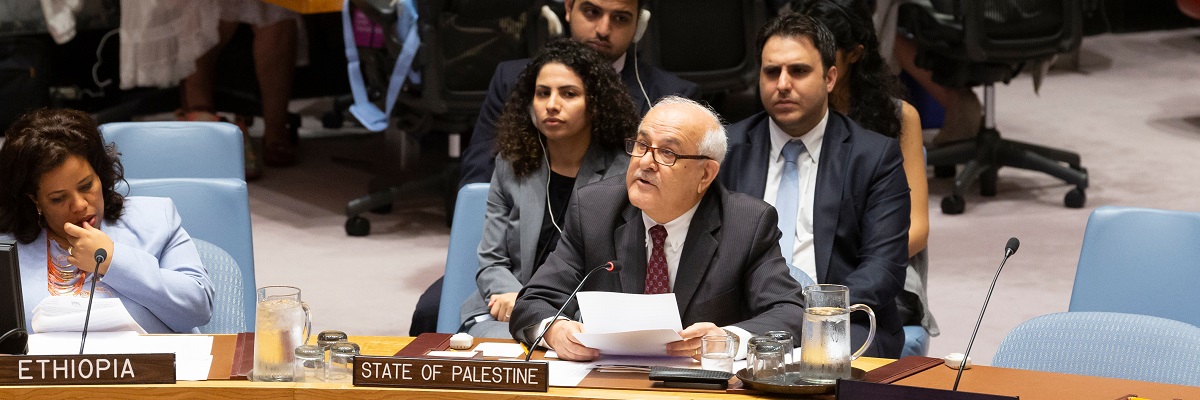Defense & Security
From Ceasefire to Post-War Government in Israel and Gaza: Punishment, Patronage or Political Legitimacy?

Image Source : Shutterstock
Subscribe to our weekly newsletters for free
If you want to subscribe to World & New World Newsletter, please enter
your e-mail
Defense & Security

Image Source : Shutterstock
First Published in: Jan.10,2024
Feb.02, 2024
However a permanent ceasefire between Israel and Hamas is achieved, neither punishing Benjamin Netanyahu nor patronising a non-elected Palestinian administrative entity will produce tenable post-war governments. The only viable path will be one that is paved with political legitimacy. Two months after Hamas’ attack on Israel, UN Secretary General Antonio Gutterres invoked Article 99 of the UN Charter to formally bring the gravity of the war in Gaza to the attention of the Security Council. Gutteres judged that the war was “fast deteriorating into a catastrophe with potentially irreversible implications for Palestinians as a whole and for peace and security in the region.” While such concerns are thus being expressed at the highest international level, it remains an open question how Israel and Gaza are to be governed once a permanent ceasefire is eventually achieved. Unresolved and volatile conditions in local, regional, and international political environments indicate that a variety of factors will need to be considered in any credible post-war proposal. Locally ‒ in Israel, the West Bank, and Gaza ‒ it is difficult to identify anything resulting from the November 2023 truce that was beneficial to the Netanyahu government. By allowing negotiations with Hamas to proceed (via Qatari mediators), in order to free a limited number of captives, Netanyahu was being drawn away from his initial position of outright refusal to “surrender to terrorists,” and drawn into a pragmatism of dividing members of hostage families from one another. Predictably, Netanyahu faced renewed public anger from the families of those still in captivity once the truce broke down. On the Palestinian side, and unpromising for both the Netanyahu government and the Fatah-led Palestinian Authority (PA) in terms of their ability to manage future conflict in the West Bank, the release of 240 Palestinian teenage and women prisoners (some jailed for attempted murder) prompted scenes of public jubilation. This provided authentic propaganda for Hamas during the truce, spreading in real time on Telegram channels. One Palestinian former detainee announced she was proud of Mohommed Deif and Yahya Sinwar for not having forgotten her. Her gratitude to Hamas’ leaders in Gaza was an expression of popular resistance that is not likely to evaporate when the women and children return to their homes. Even less encouraging for the prospects of effective security cooperation between the PA and Israel in the West Bank, the release of these women and minors indicated simultaneously that Israel was unable to keep them incarcerated and that the PA had been able neither to prevent their incarceration previously, nor to free them now. Since 1994 the PA’s Western-endorsed security cooperation with Israel has proceeded alongside Israel’s “administrative detention” of thousands of Palestinians in the West Bank, detained without trial or charge. The liberation of these 240 women and minors can only be attributed to the negotiation with Hamas into which Israel has been drawn. One poll conducted during the week of prisoner exchanges showcased a dramatic increase in Palestinian support for Hamas. These street-level displays, of course, do not indicate that Hamas is on the way to mobilising political imagination throughout the West Bank. Nor is it capable of forcing itself back into the sphere of government from which it was removed after winning the 2006 elections. But it would be difficult to describe the truce and the prisoner exchanges as having damaged Hamas’ popular legitimacy. Regionally, Israel’s siege on Gaza has elicited strong responses that have demonstrated increasing antagonism on and around Israel’s borders. To the north, Turkiye’s President Recep Tayyip Erdoğan has called Netanyahu “the butcher of Gaza.” To the south, Yemeni Houthis have staged brazen attacks on Israeli-linked ships in the Red Sea. In each case, Iran’s presence has been felt. Turkiye’s cultivation of diplomatic common ground with Tehran over Gaza has proved troublesome, while the Houthis have relied considerably on Iran for military aid. But glib condemnation of these regional alliances will be of little use when it comes to developing viable post-war political and governmental arrangements. Simply pointing the finger at Iran will not provide Israel with new geostrategic techniques for avoiding a multi-front war. Nor will it provide the United States with new geostrategic ideas for controlling the international disorder emanating from Gaza. At the international level, the strained position of the United States has become more pronounced, and the United Nations more vocal. As fighting resumed following the truce, US Secretary of State Antony Blinken told Israel’s war cabinet that it may not be able to count on many more months of international support for its siege on Gaza. Secretary of Defence Lloyd Austin meanwhile has suggested that Israel risked “strategic defeat” if it could not combine its war aims with the protection of civilians. The US-Israel relationship may be “ironclad” now as earlier, but the US government’s highest foreign policy and defence officials also seem to be acknowledging that Israel’s sovereignty has been challenged as never before. While Israel is naturally focussed on military objectives and geostrategic conditions, Blinken and Austin were making it clear that the lives of civilians in Gaza lives must also be taken into account. By 6 December, international pressure had come to fully bear on Israel’s prosecution of its war aims. While the UN Security Council’s permanent ceasefire resolution was vetoed by Washington, it was clear that what E.H. Carr called the “political community of nations” was keen to make its wishes heard. Ideally these wishes will lead to a cessation of hostilities, comparable to that achieved by Resolution 1701 in 2006, at the close of the second Lebanon war. However, a month later the wishes of the international community had not become a reality; no binding UN Security Council resolution had brought a ceasefire into effect. As the war proceeds into 2024, sceptics might be forgiven for observing that, today, declarations of international governance still have something about them of the “embryonic character” that Carr warned of in The Twenty Years’ Crisis, 84 years ago. By whatever means a permanent ceasefire is achieved, all parties will eventually need to face the long-term question: “How are Israel and Gaza to be governed after the war?” In order to be credible, post-war proposals will need to put aside the attractions of punishment and patronage, and will need to come to terms with enduring fundamentals of political legitimacy. Punishing Benjamin Netanyahu by calling for his resignation may seem legitimate to the families whose loved ones have been killed or are still in captivity. Certainly, there are enough former Israeli statesmen and security chiefs who consider Netanyahu a disgrace or a liability. But having Netanyahu gone will not produce a new coalition government ˗ led by Benny Gantz or anyone else ˗ that can magically restore psychological security in the lives of Israelis and political stability in the State of Israel. Punishment will not induce rehabilitation. International patronage of an unelected Palestinian administrative body may be the best way to prevent inclusion of Hamas in a post-war government. Such a consideration may also ensure that the Palestinian Authority is “revitalised.” But this would be a repeat of 2007, when principles agreed among outsiders overturned Hamas’ election victory. At worst, a Palestinian government managed under international patronage would be a reversion to the post-Oslo dialectic that Anne Le More described in 2008 as “political guilt, wasted money.” Any credible proposal for democratic post-war government in Israel and Gaza will need to start from the political fundamentals as summed up by Olivier Roy: “there can be no democracy without political legitimacy.” The future will need to be governed by people and parties arising within local political life, and who are voted for by the local population, and who are held accountable by the political will of Israelis and Palestinians themselves.
First published in :

Benedict Moleta is a PhD student in international relations at the Australian National University, commencing 2024. His Master’s thesis (2020, University of Sydney) was on relations between the European Union and Palestine, and he is currently researching Australia’s criminal listing of Hamas. His BA was in German and European Studies, with interests from Lessing to Lenin. Benedict is also a singer.
Unlock articles by signing up or logging in.
Become a member for unrestricted reading!